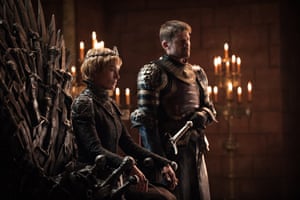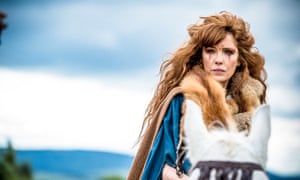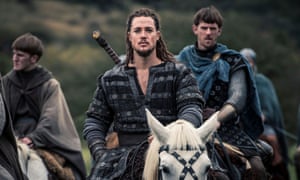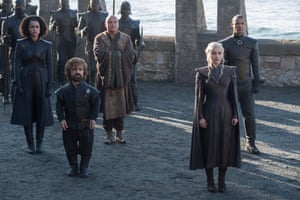How Game of Thrones put TV drama to the sword | Television & radio
On Sunday evening the biggest drama on television returns. With only 13 episodes of epic fantasy Game of Thrones left â€" seven to be broadcast this summer and six to be shown next year â€" excitement levels are high as critics and fans fall over themselves to predict who will survive, who will die gruesomely and who will end up on the Iron Throne.
That excitement is reflected in the viewing figures. Every episode of Game of Thrones is watched by an average of about 25 million viewers, and that’s only the figure provided by US broadcaster HBO. While viewers across the world eagerly tune in on different channels (in the UK it is shown on Sky Atlantic), many millions more will watch illegally â€" the show has held the record for the world’s most pirated television show for the past five years.
Small wonder then that a recent piece on culture website The Ringer branded it television’s only blockbuster series, arguing that: “As both a phenomenon and a carefully managed machine, Thrones has more in common with Star Wars than Veep.â€
It’s true that, like the Star Wars franchise, Game of Thrones is a cultural behemoth, referenced throughout pop culture, celebrated at fan conventions, inspiring everything from pop-up bars to a live concert experience. Its biggest impact, however, can be seen in its own medium: the series casts a shadow over the television landscape as least as large as that of one of its fire-breathing dragons.

From straightforward historical epics such as The Last Kingdom to more experimental fantasy fare like American Gods, the influence of Game of Thrones can be seen all over the small screen. It’s in the bloody violence of comic-book adaptation Preacher and the dour grunts of the short-lived medieval tale The Bastard Executioner; it is in the interest of pirate drama Black Sails in machiavellian power struggles, and the dark, dank settings of Taboo.
Nor is it likely to fade away any time soon: next year will see the arrival of both the BBC’s epic retelling of the Trojan war, Troy: Fall of a City, and Sky Atlantic’s take on Celts and Romans, Britannia, written by the current toast of the West End, Jez Butterworth. US streaming channel Hulu, fresh from the success of The Handmaid’s Tale, is planning to bring Sarah J Maas’s bestselling Throne of Glass series to TV; Netflix is adapting Polish fantasy writer Andrzej Sapkowski’s popular Witcher saga, and just last week HBO announced plans to make Nnedi Okorafor’s complex and powerful fantasy Who Fears Death with Game of Thrones author George R R Martin on board as executive producer. The channel has also commissioned Lovecraft Country, a horror anthology series from Get Out director Jordan Peele and JJ Abrams, and four Game of Thrones spin-offs, which remain shrouded in secrecy but will be set in the same fantasy world.

“People are going to be stealing and borrowing bits from Game of Thrones for years and years,†says Maureen Ryan, television critic at Variety. “I think it’ll be hard to create a show as widely seen and talked about but that won’t stop people trying. We’ve already had a host of shows with bearded guys fighting with swords. A lot of them have been either mediocre or terrible, but I would assume [we’ll get] beardy sword fights for some time to come.â€
Anne Mensah, Sky’s head of drama and the woman who commissioned Britannia, agrees that epic TV’s current moment is partially driven by the success of Game of Thrones. “That said, I also think it’s always been a popular genre in the UK,†she adds. “Look at I, Claudius or more recently Rome. We commissioned Britannia not to have a new Game of Thrones but because of the chance to work with someone as brilliant as Jez Butterworth. That said, I think the thing about Game of Thrones that people do perhaps want to tap into is its authenticity. It’s never boring and it always feels absolutely committed to its world.â€
These days when it swaggers on to our screens, each season like an all-conquering rock band on the last leg of a greatest hits tour, it’s easy to forget that Game of Thrones was once considered a huge risk. The idea that a fantasy epic could become not just a hit but a hit outside of its established fan base was almost inconceivable and there was much industry speculation at the time about how HBO, the celebrated home of prestige dramas such The Wire and The Sopranos, would be embarrassed by this dalliance with a genre best left to the darker corners of bookshops. Instead it was the naysayers who looked foolish as millions of viewers were swiftly sucked into a complicated story of power, corruption and betrayal.

“The biggest strength of Game of Thrones was always its characters,†says Ryan, adding that this is what those hoping to recreate its magic elsewhere often miss. “The show’s success has definitely led some networks to take the wrong risks; to think that if a show is derived from a popular series of books or comic books then it’s bound to be a big hit. Well, nope! It’s the same thing that happened with Lost, the idea that if you shoved a lot of actors in a genre-ish show with a complicated mythology then that was enough. But that’s not why people liked Lost or Game of Thrones.â€
For it is the very scale of the success of Game of Thrones that has so transformed the TV landscape. This is not simply an epic fantasy show, it’s a fantasy show that exists on an epic scale. Everything about it feels bigger than most other programmes, from the sets and the sheer number of stories and characters, to the size of those viewing figures. And because of that scale and the show’s subsequent success it’s hard to escape the feeling that we are, as Ryan says, watching “the blockbuster-isation of TVâ€.
“My sense is that the creation of and marketing of Game of Thrones was part of a pretty conscious bid by HBO to shift the focus of big budget audio-visual productions away from cinema and into prestige TV,†says Martin Barker, emeritus professor at Aberystwyth University and coordinator of the Game of Thrones Research project, which examines what the series means to its fans. “That has had an influence on the medium â€" TV is becoming ‘streamed boxset’ and we’re still working through the implications of this.â€
Chief among those implications is the ability to tell stories in more inventive ways. Game of Thrones notoriously broke with tradition in its first series, killing off the show’s ostensible hero, Ned Stark (Sean Bean) in the penultimate episode. Since then the deaths have become almost commonplace â€" this is a series where no character is safe and the traditional rules of television don’t apply. “What we’re seeing is the sense that television has become more like a novel,†says Mensah. “And that allows you to take more risks, to take stories in different directions and tell them in different ways. It gives you a really exciting platform.â€

Novelist Daniel José Older, whose acclaimed Shadowshaper series was recently optioned for television, agrees. “The cable narrative show renaissance we’re witnessing is related to stories being able to break free from that 90-minute or two-, even three-hour movie model, which is very confining,†he says. “Some stories need room to stretch out and grow and gather momentum, in different ways and rhythms than the big screen allows for. Game of Thrones is a great example of that: it’s huge in every way.â€
That said, Older is wary of handing the series too much credit. “I love the show for a lot of reasons but representation has not been their strong point,†he says. “When I think about work that’s pushed us into new territory with diverse casting, then it’s not Game of Thrones but shows like Luke Cage that come to mind.â€
It’s true too that the show has sometimes sacrificed complexity for broad brushstrokes. “What I like least about it is an attitude it often displays that could be summed up as ‘so sorry, but the weaker people generally lose â€" it can’t be helped, but there it is’,†says Ryan. “There’s kind of this shrug about evil, amorality and greed generally winning out â€" not always but enough for it to undercut the complexity of what the show explores elsewhere.â€
This nihilism could be said to be the most malignant aspect of Game of Thrones â€" certainly the worst of the copyists fall headlong into the “all bleakness, all of the time†trap, failing to notice that the world’s biggest drama series is stuffed full of humour and sly asides. There are tender grace notes amid the heavy metal noise and it is the television shows that recognise that which will have the best chance of replicating its success.
“What Game of Thrones brings to the table is incredibly high production values mixed with terrific, expansive storytelling and world-building,†says Older. “If you give other narratives that kind of nurturing, that room to grow, that budget, then you will see very successful franchises I’m sure.â€
Game of Thrones is on Sky Atlantic, Monday at 9pm. It can also be watched live (at the same time as the US screening) at 2am that morning. Britannia and Troy will be shown in 2018
COMING UP
Troy: Fall of a City The BBC’s take on the Trojan war is one of the most eagerly awaited dramas of next year
Britannia Sky Atlantic is producing Jez Butterworth’s Roman invasion of Britain saga. Stars David Morrissey, Mackenzie Crook and Zoë Wanamaker
Lovecraft Country Produced by JJÂ Abrams and Jordan Peele with a script from the highly rated Misha Green, creator of slavery drama Underground
Who Fears Death Nnedi Okorafor’s haunting coming-of-age tale of magic and war set in a post-apocalyptic Africa is coming to HBO
The Witcher Netflix recently announced this adaptation of Polish fantasy writer Andrzej Sapkowski’s popular saga

0 Response to "How Game of Thrones put TV drama to the sword | Television & radio"
Posting Komentar